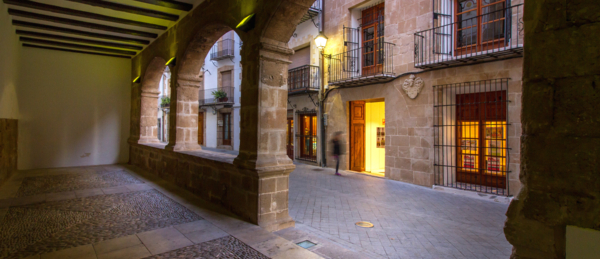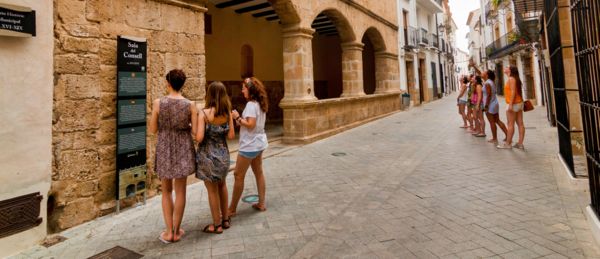- Home page /
- Discover Benissa /
- Culture /
- Monuments & museums /
- Old Council Rooms. Interpretation Center
Old Council Rooms. Interpretation Center
This Renaissance-style building, with its large stone arches, is one of the most significant historical buildings in town
The building
This building was built in the late 16th century at the heart of the Old Town, on the former Main Street. It was mainly used as a depot for the wheat trade, which was vital during the middle ages. It eventually became the Council Hall (the equivalent of the modern-day Town Hall), hosting the Council, archive, prison and administrative positions of the period within its narrow halls. In the 20th century it was used as a one-room school (for Primary Education and high school). On the inside it features an almond-peeling machine that was invented and patented by local industrialist Silvestre Ivars and which was highly successful in the nineteen thirties.
Interpretation Center
The population of Benissa boasts an extensive history and heritage. Evidence of this lies in the indelible traces bequeathed to us since the Neolithic era, some of which can be easily observed while strolling through the municipality.
The municipality of Benissa recognizes the need to highlight these findings and provide a rigorous yet educational interpretation of our history. This has led to the intention of establishing a City Interpretation Center that makes this knowledge accessible to both citizens and visitors.
The chosen location for the museum is the Llotja building, also known as the Council Hall.
The main objective of this Interpretation Center is to disseminate the history of the city of Benissa and enhance the value of its heritage. Another goal is to generate interest in exploring, beyond this center, the city and its surroundings by promoting various routes and experiential visits.
Considering the characteristics of potential users, such as the diversity of age, culture, and nationality, along with the limitations of the exhibition space, the contents are limited to what is deemed basic and understandable.
However, the proximity of the Center to other entities such as the Casa de Cultura, the Municipal Archive, and the Municipal Library allows more knowledge-hungry visitors to expand their information in these other places.
Therefore, this Interpretation Center aims to valorize both the material and immaterial cultural heritage, enabling us to understand the history of our ancestors and keep the memory of Benissa alive. It also seeks to stimulate the interest of visitors in getting to know the city better.


